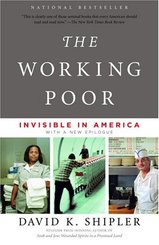
Author: David K. Shipler
Publisher: 2004, Vintage Books
Lexile Measure: n/a
Classification: Non-fiction
Summary:
In this nonfiction work by Pulitzer prize-winning author David Shipler, Shipler discusses the problem of poverty in the United States. He does so by following the lives of numerous working poor Americans for several years. He then presents their stories to illustrate the complexity of the problem of poverty and examines the effectiveness (or lack thereof) of our society’s attempts to address it.
Publisher: 2004, Vintage Books
Lexile Measure: n/a
Classification: Non-fiction
Summary:
In this nonfiction work by Pulitzer prize-winning author David Shipler, Shipler discusses the problem of poverty in the United States. He does so by following the lives of numerous working poor Americans for several years. He then presents their stories to illustrate the complexity of the problem of poverty and examines the effectiveness (or lack thereof) of our society’s attempts to address it.
|
|
Language:
This is a nonfiction work. Profanity is present only when in a quote by one of the subjects. The author uses none of his own. Examples of language used are:
Violence and Crime:
Sexual Content:
Other:
Other Helpful Reviews:
|